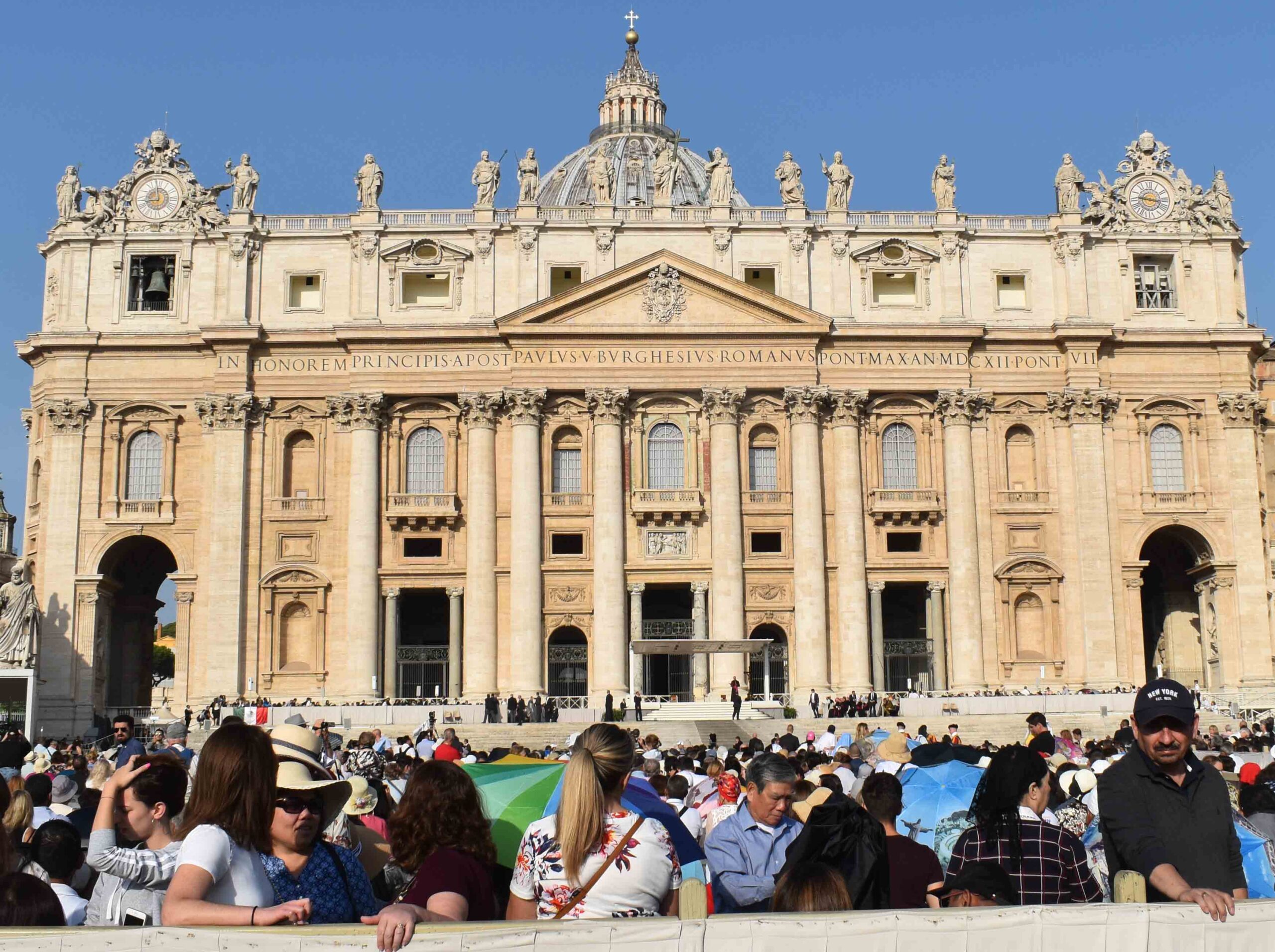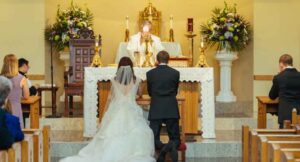Question: If two non-baptized persons married civilly or according to their own religious rites, and if they are divorced civilly, can one of the parties enter into a new marriage with a Catholic?
– Sch. Jobin, SJ
The question asked by Sch. Jobin, SJ is a marriage case quite common in the context of Indian subcontinent. If two non-baptized parties are married civilly or according to their own religious rites (Hindu or Muslim or any other religion), and if a civil divorce has been obtained, and if the party wants to marry a Catholic, can the new marriage be allowed?
The answer is “Yes”. Though this norm is outside the Code of Canon Law, the Catholic Church has a provision for such marriages under potestas Ecclesiae, i.e., the power of the Church. If two non-baptized who have been separated after having obtained a civil divorce, and if either of them wants to marry a Catholic, such a marriage cannot be allowed by the Catholic Church. The reason is theological and doctrinal. In the eyes of the Church, there exists a prior bond even in a natural marriage as a result of civil or any other form of marriage celebrated in other religious rites. Therefore, to enter into a new marriage with the Catholic party, the prior marital bond needs to be dissolved or annulled. Strictly speaking, a new marriage with a Catholic will take place only when the divorced non-Catholic person has obtained an annulment or a dissolution of his or her marriage. This case should be referred to the Local Ordinary or his delegate so as to obtain the dissolution of such a marriage from the Holy Father and to enable the person concerned to marry a Catholic.
Dissolution of a marriage in favor of faith
A marriage between two non-baptized persons or a marriage between a baptized and a non-baptized can be dissolved by a special provision in the Catholic Church known as in favorem fidei (meaning “in favor of faith”), if after obtaining a civil divorce, one of them wants to marry a Catholic. Dissolution of a natural marriage “in favor of faith” is a provision under the “potestas Ecclesiae”, i.e., the power of the Church.
Let me illustrate this with an example. Aditya and Suchitra, two Hindus are married, but the marriage failed. They have obtained a divorce from the civil court. Now, Suchitra who is a Hindu wants to marry Vikas a Catholic. But in the eyes of the Church, the marriage between Aditya and Suchitra subsists, i.e., there exists a prior bond – an impediment to the new marriage (can. 1085). What is to be done? The marriage between Aditya and Suchitra can be dissolved in favor of faith of Vikas who is a Catholic. Who can ask for the dissolution? It is only Suchitra who petitions for the dissolution of prior bond.
Another example is a marriage between a non-baptized (Hindu or any other religion) and a baptized non-Catholic. Supposing Aryan (a Hindu) and Anjali (a Jacobite) are married civilly and have obtained a civil divorce. Now, Anjali wants to marry Ankit a Catholic. The marriage between Aryan and Anjali can be dissolved in favor of faith of Ankit, and only Anjali can petition for the dissolution.
The Instruction "Potestas Ecclesiae"
The Supreme Pontiff Pope John Paul II, in an audience granted on February 16, 2001, approved the Norms with his Instruction Potestas Ecclesiae on the Dissolution of marriage in favor of faith, which had been considered in an ordinary assembly of the Dicastery of the Doctrine of the Faith, and ordered them to be observed faithfully.
This was signed by Cardinal Joseph Ratzinger, the Prefect of the then Dicastery of the Doctrine of the Faith in Rome, from the halls of the Dicastery for the Doctrine of the Faith, on April 30, 2001,
the Memorial of Saint Pius V.
The norms of the Instruction Potestas Ecclesiae are given under the following articles:
Article 1:
A marriage entered by parties, of whom at least one is not baptized, can be dissolved by the Roman Pontiff in favor of the faith, as long as the marriage itself had not been consummated after both spouses received baptism.
Article 2:
It belongs to the Congregation of the Doctrine of the Faith to examine individual cases and, if it is expedient, to submit the petition seeking the favor to the Supreme Pontiff.
Article 3:
The diocesan bishop and those equivalent to him in law, or the eparchial bishop, are competent to instruct the process.
Article 4:
To grant the favor of the dissolution of the bond, it is required that, at the moment of the concession:
1°. no possibility exists to restore the partnership of conjugal life;
2°. the petitioner was not the culpable, exclusive, or prevalent cause of the destruction of conjugal living, and the party with whom the new marriage is to be contracted or convalidated did not provoke the separation of the spouses by his/her own fault.
Article 5:
§ 1. If the Catholic party intends to contract or convalidate a new marriage with an unbaptized person or a baptized non-Catholic, the Catholic is to declare that he/she is prepared to remove dangers of defecting from the faith, and the non-Catholic party is to declare that he/she is prepared to allow the Catholic party the freedom to practice his/her religion and to baptize and educate the children as Catholics.
§ 2. The favor of a dissolution is not granted unless this declaration was done in writing and signed by both parties.
Article 6:
The process is unable to be instructed for the dissolution of the bond of a marriage which was contracted or convalidated after obtaining the dissolution of a previous marriage in favor of
the faith, and is not to be presented to be examined by the Congregation for the Doctrine of the
Faith.
Article 7:
§ 1. A petition for the dissolution of the bond of a non-sacramental marriage entered with a dispensation from the impediment of disparity of cult can be presented to the Supreme Pontiff if the Catholic party intends to enter a new marriage with a baptized person.
§ 2. In the same case, the petition can be presented to the Supreme Pontiff if the non-baptized party intends to receive baptism and to enter a new marriage with a baptized party.
§ 3. The bishop is not to direct the petition to the Congregation for the Doctrine of the Faith if a prudent doubt exists about the sincerity of the conversion of the petitioner or the intended spouse, even though one or both have received baptism.
Article 8:
When it concerns a marriage to be entered by a catechumen, the marriage is to be deferred until after baptism; but if this cannot be done for grave reasons, there is to be moral certitude that the baptism will be received soon.
Article 9:
Whenever there are special difficulties about the manner in which the petitioner intends to fulfill his/her obligations toward the former spouse and any children who may have been born, or there is a fear of scandal from granting the favor, the bishop is to consult the congregation.
Article 10:
If a positive doubt arises on the basis of any ground about the validity of that marriage whose dissolution is sought, either in the process before the bishop or in the examination before the Congregation of the Doctrine of the Faith, the petition is to be directed to the Roman Pontiff
with mention made of this doubt.
Article 11:
§ 1. The bishop is either to carry out the instruction of the process personally or is to commit it to an instructor selected from the judges of the tribunal or from persons approved by him for this function, with the assistance of the notary and the intervention of the defender of the bond.
§ 2. This commission is to be done in writing and must be evidenced in the acts.
Article 12:
§ 1. Assertions must be proven according to the norm of the law, either by documents or by depositions of witnesses worthy of belief. § 2. Both spouses are to be heard in the instruction.
§ 3. The force of full proof cannot be attributed to the declarations of the parties, unless other elements are present which corroborate them and from which moral certitude can be formed.
Article 13:
§ 1. Documents, both originals and authentic copies, must be reviewed by the notary.
§ 2. Documents to be transmitted to the Congregation for the Doctrine of the Faith are
to be complete, and copies are to be transmitted after being reviewed by the notary of the bishop.
Article 14:
§ 1. After the defender of the bond has been cited, the examination of the parties and
witnesses is to be done by the instructor, to whom the notary must give assistance.
§ 2. The instructor is to administer to the parties and witnesses the oath to tell the truth or to confirm the truth of what they have said; if anyone refuses to take it, the person is to be heard without the oath.
§ 3. The instructor is to question the parties and witnesses according to a questionnaire prepared beforehand by the instructor or the defender of the bond; other questions can be added, if the case warrants it.
§ 4. Responses must be signed by the party, the instructor, and the notary.
Article 15:
§ 1. If the other party or a witness refuses or is unable to appear before the instructor
and give the deposition, their declarations can be obtained before a notary or by any other legitimate method, provided that their genuineness and authenticity are evident.
§ 2. The absence of the other party from the process, declared according to the norm of law, must be evidenced in the acts.
Article 16:
§ 1. The absence of baptism in one or the other spouse must be so demonstrated that all prudent doubt is removed.
§ 2. Witnesses are to be examined with consideration of their quality, as it is had in parents and blood relatives of the unbaptized party, or those who were present to the person from the time of infancy and knew the entire course of the person’s life.
§ 3. Witnesses are to be questioned not only about the absence of baptism but also about circumstances and indications from which it appears probable that baptism had not been
conferred.
§ 4. Care is to be taken also to inspect the baptismal registers in places where it is evident that the party, said not to be baptized, lived from infancy, especially in the churches which the party may have attended and in which the party celebrated marriage.
§ 5. If the marriage had been celebrated with a dispensation from the impediment of disparity of cult, the instructor is to include in the acts a copy of the dispensation and the prenuptial proceedings.
Article 17:
§ 1. If at the time when the favor of a dissolution is being sought the unbaptized spouse receives baptism, an investigation must be done concerning possible cohabitation after the baptism; witnesses are also to be questioned about this.
§ 2. The parties themselves in the case are to be questioned whether after their separation they again had some relation between themselves and of what kind, and especially whether they performed the conjugal act.
Article 18:
§ 1. The instructor is to gather information concerning the state of life of the other party and is not to omit reference whether the party attempted a new marriage after the divorce.
§ 2. The instructor is to question the parties and witnesses about the cause of the separation or divorce, so that it is apparent whose was the fault for the breakup of the marriage or marriages.
Article 19:
§ 1. A copy of the divorce decree or sentence of civil nullity of the parties is to be presented.
§ 2. Copies of the divorce decree or civil sentence of nullity and the dispositive part of the canonical sentence of marriage nullity of any marriages attempted by either intended spouse are to be presented, if they exist.
Article 20:
§ 1. The instructor is to indicate whether the petitioner has had offspring and how the
petitioner provides or intends to provide for their religious education, according to the laws and the petitioner’s abilities.
§ 2. The instructor must also question about the moral or civil obligations toward the
first spouse and any offspring who may have been begotten.
Article 21:
§ 1. The petitioner or the intended spouse, if he/she will convert and be baptized, is to be questioned about the time of the baptism and about the intention in receiving baptism.
§ 2. The pastor is also to be questioned about the reasons which were the cause of the baptism, especially about the probity of the parties.




